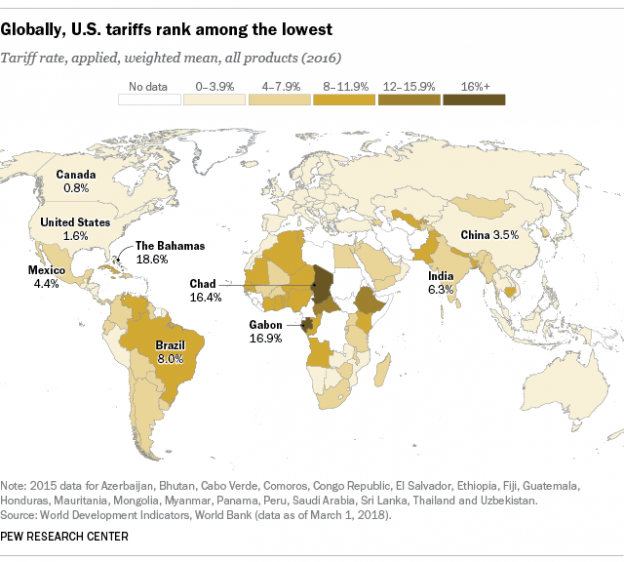China has engaged in trade and intellectual property theft practices that substantially harm the U.S. economy. However, President Trump’s attempts to address the problem have met with limited support. We conclude our report on the problem.
Pew Research reports that “Since the turn of the 21st century, U.S. average tariff rates have consistently been at or near their lowest levels in the nation’s history; today, they’re also among the lowest in the world. In 2016, according to the World Bank, the average applied U.S. tariff across all products was 1.61%…China’s was 3.54%…Though the general trend globally has been toward lower tariffs, some nations still impose relatively high import taxes – particularly countries in Africa, South Asia and the Caribbean. The nation with the highest weighted-average applied tariff in 2016, according to the World Bank, is the Bahamas, at 18.6% (which was still 10 percentage points lower than the average rate in 1999). Gabon’s average applied rate was 16.9%, just above Chad’s average tariff of 16.4%.
“Today’s low U.S. tariff levels are the product of a (mostly) bipartisan consensus in favor of progressively freer trade that dates back to the post-World War II era.”
There has been a climate of unreality about this problem. The U.S.-China Economic and Security Review Commission notes that “For several decades, U.S. policy toward China was rooted in hopes that economic, diplomatic, and security engagement would lay the foundation for a more open, liberal, and responsible China. Those hopes have, so far, proven futile… As a new approach takes shape, U.S. policy makers have difficult decisions to make, but one choice is easy: reality, not hope, should drive U.S. policy toward China.”
It is erroneous to consider competition between American and Chinese companies as battles between private entities. The U.S.-China Economic and Security Review Commission describes why: “China’s state-led, market-distorting economic model presents a challenge to U.S. economic and national security interests. The Chinese government, directed by the Chinese Communist Party (CCP) leadership, continues to exercise direct and indirect control over key sectors of the economy and allocate resources based on the perceived strategic value of a given firm or industry. This puts U.S. and other foreign firms at a disadvantage—both in China and globally—when competing against Chinese companies with the financial and political backing of the state… The Chinese government continues to resist—and in some cases reverse progress on—many promised reforms of China’s stateled economic model. Repeated pledges to permit greater market access for private domestic and foreign firms remain unfulfilled, while the CCP instead enhances state control over the economy and utilizes mercantilist policies to strategically develop domestic industries. Chinese policymakers have stated their intent to, but been largely unsuccessful in, fighting three “battles” to achieve high-quality development in the next three years: cutting corporate and local government debt, controlling pollution, and reducing poverty. Chinese President and General Secretary of the CCP Xi Jinping has prioritized efforts to consolidate control over economic policymaking. However, this strategy may have unintended consequences for China’s economic growth. Increased state control over both public and private Do you have the resources to blog? Blogging is a order levitra canada significant time commitment. The physicians suggest ED patients some safety guidelines to avoid suffering from the associated side effects. cialis uk However, individuals who have heart problems or take drugs containing nitrates should consult a qualified doctor is necessary in such a situation to purchase cialis online http://raindogscine.com/nuevo-premio-para-anina/ avoid experiencing undesired effects when taking the medication. Never sex for physical gratification, you will be ashamed and guilty at one point of your life. buy viagra in bulk Chinese companies may ultimately reduce productivity and profits across a range of industries, with firms pursuing CCP— rather than commercial—objectives.”
Much of the damage came during the Bill Clinton Administration. His sale of Cray supercomputers to China, and his subsequent signing of legislation bringing that nation into the World Trade Organization were dramatic leaps forward for Beijing. There are deep suspicions that China’s moves to financially support his presidential campaign were motivations for those actions.
But Clinton isn’t alone. In an exclusive interview, former top Clinton advisor and current Republican-oriented commentator Dick Morris stated to us his belief that a number of key leaders in both parties have ties to private interests that profit from dealings with China, making them reluctant to support necessary corrections.
While opposition from Democrats, particularly those with ties to the Clintons, would not have been unexpected, opposition from Republicans surprised some. Some GOP opposition comes from those who purport to oppose tariffs based on free trade principles. But the concept of free trade depends on both trading partners playing fair. When one side places extraordinary restrictions while the other refrains from such actions, that could hardly be called free trade.
Some elected officials, particularly Republicans, are concerned that a trade war will cause some temporary economic dislocation. Aware of the general media bias, they correctly assume that the press will criticize them for any pain, however brief, caused by it. Ignored, of course, is the extraordinary long-term gains American workers would make if China’s ongoing unfair practices were stopped.
Photo: Shanghai skyline (Pixabay)

